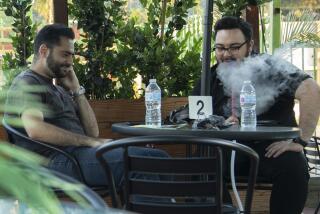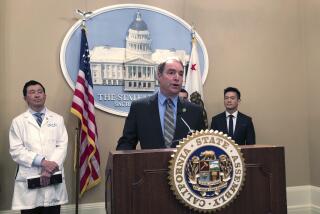States to Devise Methods to Block Tobacco Sales to Minors
- Share via
WASHINGTON — States have seven months to figure out how to catch stores that sell cigarettes to teenagers or risk losing federal health dollars, as part of a long-awaited crackdown on illegal tobacco sales.
Congress in 1992 passed a law forbidding tobacco sales to anyone under 18. The Synar amendment, named for the late Oklahoma Rep. Mike Synar, requires states to enforce the sales ban.
But the Department of Health and Human Services never told states how to do the job, and the 1994 surgeon general’s report estimates that stores let teenagers get away with buying tobacco 73% of the time.
Today, HHS will publish regulations in the Federal Register spelling out how states must catch stores that break the law and punish them until they comply with the ban.
Under the new regulations, states must:
* By Sept. 1, provide the government with a list of all stores that sell tobacco and develop an HHS-approved plan to do surprise inspections to catch illegal sales to minors. Failure can mean losing 20% of the state’s federal substance abuse grants.
* In fiscal 1997, do enough surprise inspections to report scientifically how well they are complying with the Synar amendment. Also, they must develop a government-approved time frame to meet the law’s sales goal. Each state can decide on its own how to deal with stores that break the law, and each will have a different deadline for final compliance, to reflect that some states already enforce the law better than others. Failure to comply will mean losing 30% of anti-substance abuse grants.
* By fiscal 1998, the states must be on track to meet their compliance deadlines or risk losing 40% of federal health funding.
HHS within six weeks will meet with state health officials to help them understand the new regulations and begin developing their compliance plans. The ultimate goal is that stores stop 80% of minors’ attempts to buy tobacco, something that will be tested by teens working undercover with state inspectors.
Enforcing the ban will help “stop illegal tobacco sales and discourage thousands of young people from striking the first match of a lifelong, life-threatening addiction,” President Clinton wrote Synar’s family in informing its members of the new rules. Synar died of brain cancer Jan. 9.
More to Read
Sign up for Essential California
The most important California stories and recommendations in your inbox every morning.
You may occasionally receive promotional content from the Los Angeles Times.













